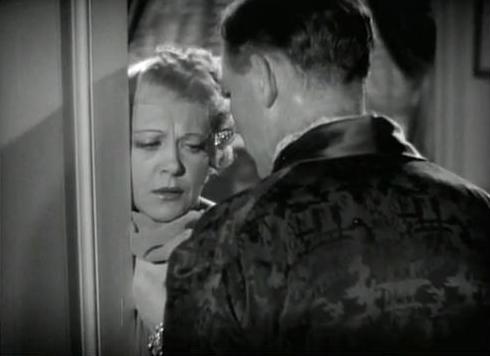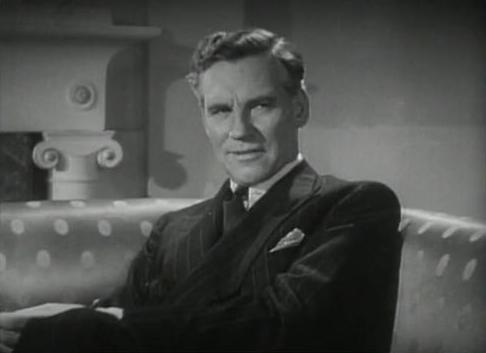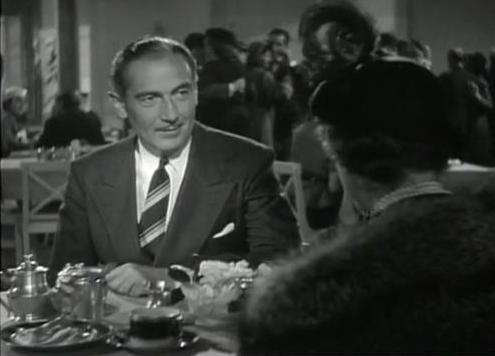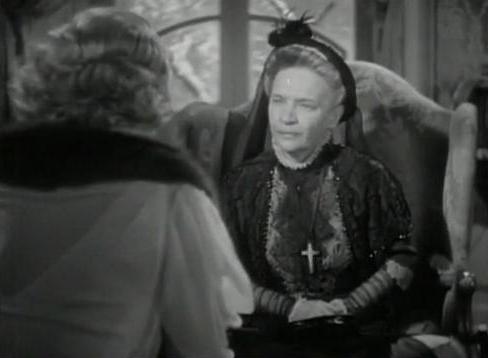I understand that Fran Dodsworth had to put up with a lot while husband Sam worked all those years, I just don’t think it could have possibly been anywhere near as much as she thought. I did have to stop and think twice about that conclusion after I made the very bright move of pulling out A. Scott Berg’s fantastic Goldwyn![]() biography to see if he had included anything noteworthy from behind the scenes on Dodsworth. Sure did.
biography to see if he had included anything noteworthy from behind the scenes on Dodsworth. Sure did.
After Sam Goldwyn pulled out all the stops to sign on William Wyler as director, Wyler made several suggestions to writer Sidney Howard about Howard’s screen adaptation of his own Broadway hit based on Sinclair Lewis’ 1929 novel of the same name. What threw me for the loop was Wyler’s insistence that “Fran should show those elements of her personality that appealed to her husband in the first place” (281). In other words a little something to stop me from despising her. Wyler said that attempts to accomplish this were “like pulling teeth” with Ruth Chatterton, who portrayed Fran, but he tried to get her to see that “Mrs. Dodsworth had a very good case for behaving the way she did.”
With all due respect to Mr. Wyler, who received the first of his record 12 Academy Award nominations for Best Director with Dodsworth, I don’t think he pulled quite hard enough. Could anyone else have turned the trick? Berg writes that Chatterton and Wyler fought constantly during the filming of Dodsworth with the actress even slapping Wyler in the face at one point! Mick LaSalle writes of Chatterton in Complicated Women![]() “Short and slightly plump, Chatterton was convinced she was beautiful, and she convinced everyone else, too” (80). Well, that hocus pocus doesn’t carry very far today for Miss Chatterton, though her main detraction for me is that terribly stagy finishing school accent, which ironically fits Fran Dodsworth to a tee.
“Short and slightly plump, Chatterton was convinced she was beautiful, and she convinced everyone else, too” (80). Well, that hocus pocus doesn’t carry very far today for Miss Chatterton, though her main detraction for me is that terribly stagy finishing school accent, which ironically fits Fran Dodsworth to a tee.
So yes, I understood that Fran Dodsworth wanted to spread her wings a little, grasp a little freedom, but in her first flirtation she teases young David Niven’s character so bad that he winds up scolding her for biting off more than she can chew. Besides using every ounce of her feminine charms on Niven’s Captain, she turns viper on husband Sam in the younger man’s presence. And all that’s just during the Dodsworths’ voyage across the Atlantic, before they even reach Europe where they plan to celebrate Sam’s retirement with their first real vacation.
Fran’s most sympathetic scene in all of Dodsworth comes just prior to her shipboard indiscretion, in her first scene where Sam comes home to her after having just completed the sale of his business. When Sam tells her he’s “rarin’ to go” having “always wanted to see London and Paris,” Fran replies that she “wants much more than a trip out of this.” She wants “a new life all over from the very beginning. A perfectly glorious free adventurous life.” Then she takes a dig at their home town, Zenith, which Sam takes exception to and she responds with the perfect summary of her motivations:
Have you ever thought what Zenith means to me? You go down to the plant and deal in millions and have a marvelous time. I go down to the kitchen and order dinner. Then there’s the ladies lunch and the bridge, always the same ladies. And dinner, same people we dined with last week. After dinner poker for the men and women for the women. There’s talk of children and doctors and servants and the garden club … I want all the lovely things I’ve got a right to. In Europe a woman of my age is just getting to the point where men begin to take a serious interest in her … After all I’ve got brains and thank heavens I’ve still got looks. No one takes me for over 32, 30 even.
Now that’s a convincing case for having a little fun and even Sam agrees vowing to enjoy life going forward. But while this points out twenty years of a level of previous neglect, she doesn’t even give the poor sap a chance to remedy the harms done to her through those years of loyal service. She’s dancing in Niven’s arms the moment the opportunity presents itself. Why’d she even bother sticking to Sam this long then? My guess is that her status in provincial Zenith kept her loyal all those years, but her disdain for their town didn’t escape Sam’s oldest friend Tubby (Harlan Briggs), who pulls out all the stops in trying to keep Sam from taking this trip. Once an ocean separates her from home Fran takes open shots at Zenith and her old friends at every opportunity.
While her single scene set in Zenith showed warning signs, Fran’s behavior on the ship broke my sympathies towards her and she never repaired them back going forward. Maybe if her actions were a little more subtle on the ship, but Chatterton takes it all to the extreme, fawning over Niven and snapping at Sam for no good reason. She keeps this up throughout, appropriately upping the emotional dosage as we go but always seeming a little bit ahead of where she should be. Once Niven teaches Fran her lesson and she has her feet firmly entrenched on European soil she continues to view Sam as nothing more than a safe haven as she conducts affairs with characters played by Paul Lukas and Gregory Gaye. When she finally receives her comeuppance I let out a cheer. When Sam relents a little later than I felt it worth his consideration to do so I cried out, “No, no, no!” Did I miss something? Fran fans, feel free to tell me below.
Just maybe I wasn’t too far off the mark though. New York Times period reviewer Frank S. Nugent is no fan of Fran himself blaming Lewis’ character more than Chatterton. After summarizing Walter Huston’s perfection as Sam Dodsworth, which I will get to momentarily myself, he writes:
“We cannot feel the same about Fran Dodsworth—either as she is in the novel or as played by Fay Bainter on the stage or Ruth Chatterton in the current screen edition. There is a basic impossibility in Mr. Lewis’s premise that she and Dodsworth could have been married for twenty years before his retirement and their tragic grand tour abroad which revealed her to him for what she was—a silly, shallow, age-fearing woman of ingrained selfishness and vulgarity.”
This seems to be exactly what Wyler was hoping to correct.
No doubt Fran’s greatest weakness is her fear of aging. It is certainly the seed for much of her selfishness, though her overall shallowness seems to have sprouted out of her twenty years spent suffering in the sticks of Zenith craving the culture which was never there. When your best friend is played by Spring Byington, well, she’s surely going to be super nice, but sorry, Spring’s typically not holding open the door to a grand society entrance. But it’s that fear of aging, a perfectly understandable and totally human worry, even obsession, which spins Fran’s selfishness to unforgivable heights.
Sam actually leaves Fran in Europe, as per her advice, hoping she’ll have this all worked out of her system after awhile. When it becomes apparent that Fran will never voluntarily return, Sam makes the trip back over to collect her. He brings a harsh weapon back with him, the happy news on her that their daughter, Emily (Kathryn Marlowe), is pregnant. Of course, Fran is thrilled and hurries to the phone to call Emily with her congratulations, but the call is never made because Sam unleashes his blow in making mention of their becoming grandparents with the happy event. Fran is stopped in her tracks by the terrible reality of her age while silently, with nothing more than a glint in his eye and a slight sneer, no need of dialogue, Walter Huston has his finest moment, finally landing a hard jab to his disloyal wife.
I find it difficult to refer to Sam Dodsworth as an everyman when he has just sold his auto company for a fortune, but Sam did come from humble roots and got in on the ground floor, so despite his fortune he remains a hick at heart. Now that Dodsworth has freed himself from the voluntary restraints of his business he’s as wide-eyed as a child at every new experience. He first ruffles wife Fran’s feathers as their ship nears Europe, interrupting her flirtations with Captain Lockert (Niven) in order to pull her up on deck and show her the ship’s light indicating how close their journey is to an end.
Fran hob nobs with European society women and willingly throws herself into entanglements with upper crust men, while Sam takes in the sites and relishes common tourist attractions. All Sam needs to be happy is a drink at a sidewalk cafe and time to take in this unfamiliar world. Sam tolerates Fran’s friends, even plays host to them, while Fran isn’t interested enough in Sam to take the time to bother meeting him for a late afternoon drink. Their ideas of absorbing the culture couldn’t be more different.
Walter Huston played the part of Sam Dodsworth in Max Gordon’s 1934 smash Broadway production of Dodsworth and his intimacy with the role shows on film. Beyond his being Dodsworth, Dodsworth could be no one other than Walter Huston. Huston is completely in his own skin as the seemingly simple Dodsworth. But despite outer appearances Sam Dodsworth is not one to be trampled upon as he also uses his entrepreneurial skills in his private life and nobody gets as far as Dodsworth without having a little shark in them. He exercises patience with his wife’s infidelities, confident enough in himself to believe that they’re but a passing phase, but when Fran’s problematic behavior doesn’t straighten out he springs to action. Sam calls together his wife and her lover, Arnold Iselin (Lukas), for a no-nonsense confrontation whereby he explains his previous patience before bluntly stating that the time has come for him to take care of himself. Violence is never an issue and despite Fran’s overbearing personality and Iselin’s composed class, it’s Huston’s Sam Dodsworth whose personality dominates the room and forces his own will upon others.
Prior to Dodsworth my own favorite Walter Huston roles were, not unexpectedly, Mr. Scratch in The Devil and Daniel Webster (1941) and his whooping prospector Howard in son John’s The Treasure of the Sierra Madre (1948) for which he won his Academy Award for Best Supporting Actor. Both stand out as over the top character roles, much different from Huston’s earlier screen work. I enjoy him in pre-codes, but that’s mostly story or action that I’m really enjoying, such as in The Beast of the City (1932) or The Wet Parade (1932), not necessarily Huston himself. I really loved his wacky side in the first ten minutes or so of Gabriel Over the White House (1933), but despite a strong overall performance by Huston, who does dominate this particular film, the movie as a whole is at best uneven. But my viewing of Dodsworth crowns a new winner in my personal Hall of Huston. Sam Dodsworth isn’t over the top or just there, replaceable by numerous other competent actors the way Huston is in several of those pre-code offerings, Sam Dodsworth just is. The character is alive, just an ordinary man, so perfectly portrayed that you feel this is Walter Huston behaving as Walter Huston typically behaves.
With a year’s experience in the part on stage behind him it is no surprise that Huston owns his every moment on the screen. The character’s only weakness is that he may be too reasoned, too willing to forgive. There are moments where Fran is definitely trying to prod Sam towards a jealous fit, but he doesn’t bite. While I understand Fran’s motivations in this regard I don’t for one second believe Sam could have done more than momentarily win her over with such a fit. She just doesn’t seem to give a damn about anything but herself. In fact, Chatterton takes Fran so far over the top that her part practically plays as camp. I’m left to wonder how much better the entire film would have played had Chatterton, or another actress altogether, listened to Wyler. Instead she’s the villain of Dodsworth.
Despite her own excellence at villainy in other films that is one thing that Mary Astor is not as Mrs. Edith Cortright. If she were not so fine as Mrs. Cortright I’d suggest Astor should have been cast as the younger Fran Dodsworth as she certainly would have brought more nuance to Fran’s actions. Fourteen years younger than Chatterton in real life I can only imagine Astor biting her lip when dispensing advice to young Fran referring to her own past experiences and where Fran might find herself in a few years upon reaching Mrs. Cortright’s advanced age. Astor figures mostly towards the end of Dodsworth but has her finest moment when preparing to leave Fran and Sam’s party upon catching Fran in a somewhat compromising position with Lukas’ Iselin. “Don’t,” she advises a shocked Fran, who’s offended by the (correct) implication.
Fran’s suitors, played by Niven, Lukas, and Gregory Gaye, don’t do much to distinguish themselves to anybody but Fran. Really the cast boils down to Huston, Chatterton, and Astor, with one exception, Maria Ouspenskaya’s Oscar nominated Baroness Von Obersdorf, mother of Gaye’s Baron Kurt of the same surname. Ouspenskaya makes the Baroness’ disdain for Fran clear from the moment she enters the room for her single scene, a rejection of Fran which is clarified all the more when the Baroness dismisses her son from the room to take the dressing down up a notch. Perhaps it’s no coincidence that Ouspenskaya, like Walter Huston, was reprising her role from Gordon’s Broadway production* (as does Harlan Briggs who plays Dodsworth pal Tubby Pearson).
*The IBDB lists Dorothy Raymond in Ouspenskaya’s part of the Baroness in both runs of Dodsworth at the Shubert Theater, however both TCM.com and the A.F.I. catalog mention Ouspenskaya as having served in the stage production. On a related note, Dodsworth would be the first of stage veteran Ouspenskaya’s well remembered and well regarded character roles in Hollywood.
Besides Ouspenskaya, Huston and Wyler received Academy Award nominations for Best Actor and Director respectively, the film was nominated for Best Picture, Howard for Best Writing (Screenplay), and Oscar Lagerstrom for Best Sound Recording. Richard Day was the only Oscar winner associated with Dodsworth, winning the Academy Award for Best Art Direction. For a simple tally that’s one win, six further nominations. Despite the critical praise, including a wire from Dodsworth author Sinclair Lewis to Sam Goldwyn expressing his highest regard for the production (Berg 285), the picture flopped at the box office. Even with Sam’s down to earth nature I can only imagine Depression era audiences weren’t all that interested in the troubles of the elite. I mentioned my hesitation to accept Sam Dodsworth as everyman, I fear 1936 theatergoers weren’t biting either.
Taken out of its era Dodsworth plays excellently today as a complicated slice of married life and is well deserving of its status as one of the classics of the 1930’s. Despite Chatterton’s histrionics there are definite motivations towards her dive off the deep end and it remains interesting to see how much a man will take before he stands up for himself. As Walter Huston’s Dodsworth says in his most famous line, “Love has got to stop some place short of suicide.”










I think Fran Dodsworth’s whole problem is that she was nothing but shallow and frivolous. In Zenith, where she thought she was unable to shine, she was also unable to reveal her true shallowness, which came out in force when great opportunities presented themselves on her European trip, and she always chose the cheap flirtation, befriended people on the make, unable to see the difference between quality and finery. Instead of looking at even conventional but tasteful tourist pleasures like landmarks and museums like her husband did, she immediately gravitated to tawdry pastimes like nightclubs, parties and the people who live off those things.
She may have recognized that a wife, mother and socialite in her town lead a boring and prudent life, but she had no clue what to actually do if given the opportunity to blossom because she had no inner resources anyway. She couldn’t see it, but she had reached her personal zenith in Zenith.
Why didn’t Dodsworth see her shallow nature long before? Because he saw what he wanted to see. What we see as a shallow and snarky woman at 40, he still saw as the flighty charms of his young bride. Until finally he sees what the rest of us see.
Never the less, I do agree that the problems start with the character in the novel. Chatterton did fine with the material. Her stridence captures the desperation of the woman, clinging to the ridiculous pretensions she is so fond of.
Despite the age difference of the actresses, Fran and Mrs Cortright appear to be about the same age. Mrs. Cortright handles her loneliness and living situation with common sense, intelligence and good humour. She has little, makes the best of it and rises above it..
Fran has plenty of money and opportunity to improve herself and shine, and she squanders everything, including her reputation, on shallow pursuits because there was never anything there in the first place.
Great movie. Highly recommended. Great post too.
Muriel,
This is just a wonderful comment, thank you so much for taking the time and effort to leave it.
I wrote this post over three years ago now and it, possibly more than any other, really conflicts me. I’ve often felt in retrospect that I was too hard on Ruth Chatterton, perhaps holding her personally responsible for some of Fran Dodsworth’s flaws, but I’ve returned to read what I wrote every time after watching the movie again (probably once per year since I originally wrote this) and each time come away somewhat okay with what I’ve written.
I think I understand the character better now and am able to more sensitively relate to Fran than I did back in 2010, but I can’t help thinking Chatterton is just a little too, let’s say, shrill, in the role. I love what you say about Sam Dodsworth being blind to Fran’s flaws because he only saw what he wanted to see and it’s an idea I want to carry with me the next time I set this on to watch. I think I’ve always known that Sam’s been intentionally blind in this area, but perhaps I’ve been too drawn to Huston’s wonderful portrayal to really concentrate upon this idea.
If I ever get around to re-writing some of my earlier posts–and some, especially a year or so before this one, could stand a tune-up now that I’ve got a better grip on my craft–this would be one of the first I ‘d go for a do-over on. I think I like the overall movie much better, admire Huston and Astor’s performances all the more and wouldn’t mind smoothing out some of what I saw in Chatterton–but at the moment my basic feelings remain the same, even if they could probably be expressed a little better.
Agree, great movie, highly recommended. Thank you for your kind words about the post, but I’m not as sure there! And thank you for making me look all the more forward to my next run-in with Dodsworth!
Cliff
The problem with Fran Dodsworth is that Sam Dodsworth’s personal flaws and original tendency to take her for granted was treated like comic relief. I saw how he treated his daughter and assumed she would see to his needs, as Fran had done. It was portrayed with a great deal of comedy. But I found nothing comedic about it.
Fran’s flaws are treated with such a serious note that she is portrayed as unsympathetic. Sam’s flaws are not. I saw the gender inequality in this film and had a great deal of trouble liking it in the end.
@ladylaviania1932, I will definitely keep your comment in mind next time I play this one. This Dodsworth post continues to be the article that I most wish to revisit and revise and, to be completely honest, I’m overdue to watch it again, so I’m not really prepared to reply at this time. I’ve had the novel sitting here awhile now, and am trying not to watch until after I read it, hoping that experience gives me a bit more of the perspective a contemporary viewer would have had.